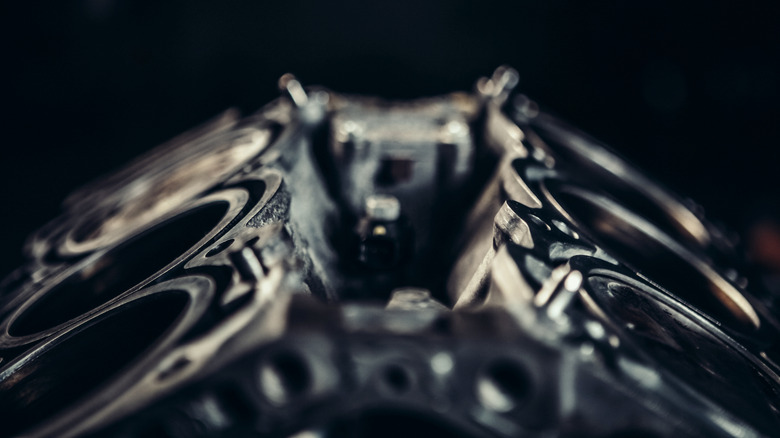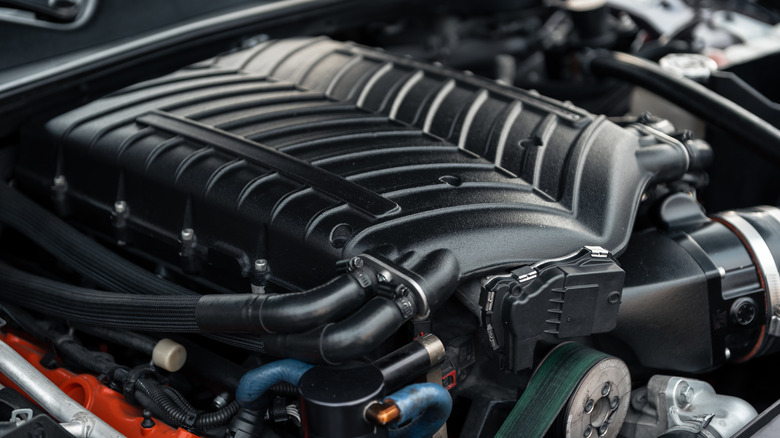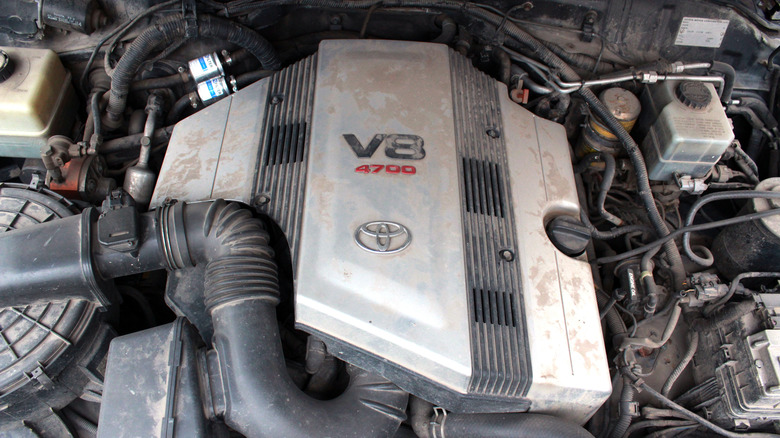The Pros And Cons Of 8-Cylinder Engines
Many moons ago, V8 engines were the standard offering in American vehicles, from jeeps to trucks to buses to cars. These Detroit workhorses were big, gas-hungry, loud, and they moved America. From around the 1930s to the '80s, they were the go-to engine option found in many motor vehicles, later falling out of favor for the V6, and eventually being supplanted by the most efficient — and now most common — four-cylinder variants. But speedy V8s were king for many years, especially during the arms race of the muscle car era, though some real eight-cylinder duds slipped through the cracks, too.
This isn't to say that V8 engines are obsolete; they're just a less common engine type for the average car. For the U.S. market, in high-performance applications like a Corvette to larger vehicles like trucks, SUVs, you can still get a V8 brute to help do some heavy lifting, but this is essentially where larger eight-cylinder engines begin and end — heavy-duty applications as opposed to commuting from A to B.
Cargo vans like the GMC Savanah and pickup trucks like the Chevrolet Silverado have V8 options, as well as beastly SUVs like the Dodge Durango SRT Hellcat with its massive 5.7-liter eight-cylinder engine. But the question that comes to mind is, why would someone in 2025 look for a V8, and what are the pros and cons to having one of these massive power plants under your hood? Let's open up the hood and find out.
Pros
Despite the rise of popularity in smaller four-cylinder engines and super-efficient hybrids, a V8 engine does offer some distinct advantages that smaller power plants simply cannot. In the world of hypercars, you'll even find V8 engines churning out 1,000-plus horsepower in 2025, producing eye-watering top speeds. But the most obvious positive attribute for these large engines is more utilitarian where, with each of the eight cylinders pumping away, these engines produce a ton of torque at low revs that is very useful in towing applications. In the modern era, many might wonder about a V6 versus V8 towing tradeoff. But for times when users need to tow a trailer or haul a very weighty payload on a pickup, V8 engines offer power in spades and are usually the preferred choice.
Another obvious pro is the general baseline horsepower that a large displacement offers, where engineers don't have to wring every last drop out of a smaller engine like a V6 or four-cylinder, having to make it rev at super high RPMs — or even add forced induction like a supercharger or turbo — for similar power potential. The 90-degree V-angle orientation is another positive attribute of these engines, which provides a natural balance and harmony over in-line configurations — depending on how the firing order is set and the type of crankshaft used — helping to reduce vibrations for a smoother ride.
Cons
A self-evident con for V8 engines is the space they take up and the sheer weight of them. Smaller displacement engines with fewer cylinders can take up less space and save on weight, meaning lighter and smaller vehicle design potential. Since there is a larger symphony of moving parts and, as such, more complexity, this could translate into more maintenance issues with a potential for costlier lifetime servicing over a V6, as an example. Another major drawback is the overall potential for higher fuel consumption, all things being equal. V8s made sense when the technology and development of better, smaller engines weren't quite there, and gas was cheap, but now they almost seem silly in the general commuting context. The financial toll of running a V8 — even though they're much more efficient than their Nixon-era predecessors — is still a major downside.
Sure, baby boomers and older enthusiasts who grew up in the muscle car era of the '60s and '70s may bask in the nostalgia of old-school Detroit brawn, seeing these V8 engines as the be-all-end-all, despite brutal fuel economy. But they also came up in an era where the environmental impact of gas guzzlers wasn't front-of-mind, which is another drawback of big engines like V8s. With a push towards electric, the future of traditional fuel-burning cars may be up in the air, but all of these concerns are still very real for many car and truck owners in 2025.


